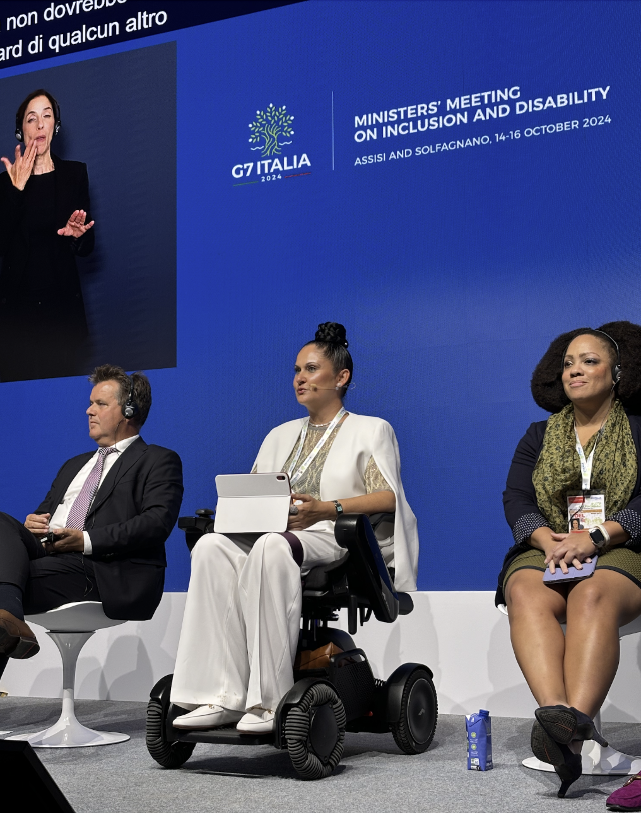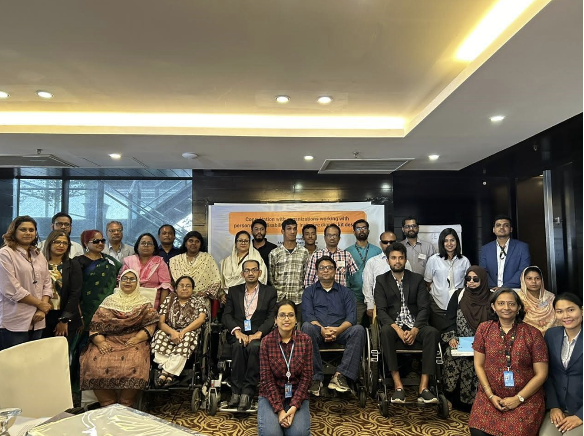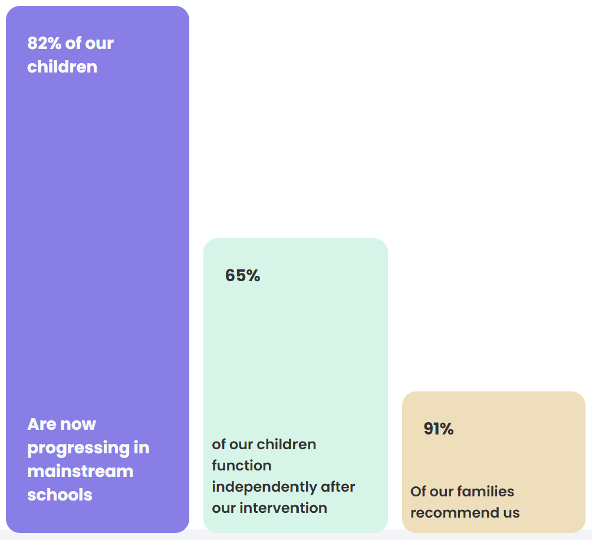Accelerate Action: International Women’s Day 2025
This International Women’s Day (IWD) 2025, the theme Accelerate Action calls for urgent change. IWD point out that full gender parity is not predicted until 2158. This highlights the danger of many women and girls being left behind if current trends go unchallenged. People with disabilities experience heightened vulnerability due to the compounded effects of intersectional marginalisation. Despite making up 16% of the global population, with 80% being of working age, only one-third of people with disabilities are employed.
In addition, the UN reports that women and girls with disabilities face significantly higher risks of violence, are twice as likely to be unemployed and three times more likely than men without disabilities to lack education and necessary healthcare. They are also severely underrepresented in leadership, politics, and advocacy, holding fewer decision-making roles and occupying fewer leadership roles in gender equality and disability rights organisations.
However, advancements in gender-inclusive innovation and access to assistive technologies (AT) provide a key pathway for accelerating action in this context. Enhancing understanding of gender is a core focus of the Global Disability Innovation Hub’s Disability Innovation Strategy 2025-2030. We aim to answer pressing research questions, embed disability innovation into national policy landscapes, test country pilots and fuel enabling environments in Low-and Middle- Income Countries. This involves advocacy for co-research and co-design practices, which advance user-defined well-being beyond economic imperatives.
Indeed, GDI founders Catherine Holloway and Victoria Austin argue that AT must be understood as a mechanism to enable users to achieve what they value, while the absence of a global framework for disability justice ‘raises the possibility for […] perverse incentives enabled by unanchored interventions.’ In this sense, there cannot be gender equality without disability justice, which prioritises the needs and capabilities of the community first.
The GDI Hub's global AT inclusion and innovation efforts align with IWD’s emphasis on decisive striving towards ‘what works.’ Moreover, the transformative areas highlighted in Accelerate Action resonate with GDI Hub’s trailblazing action and leadership in several key areas.
‘Supporting women and girls into leadership’
The Disabled Leaders Network (DLN) was jointly launched in 2019 by The Snowdon Trust and GDI Hub. Driven by its members, the network draws together exceptional students, graduates and professionals to drive leadership, collaboration, knowledge sharing and support. Member Kimberley Burrows was recently named in the Disability Power 100 as one of the 100 most influential disabled people in the UK.
Kimberley, an award-winning artist, model and activist who is blind, is serving as Student President of the Royal College of Art after earning her Master’s in Painting. Her art explores blindness, grief, and loss through inclusive installations, with her degree show pioneering the incorporation of Braille labels, soft lighting, and a self-narrated audio guide. She advocates for disability inclusion, influencing seminar accessibility, campus signage and exhibition design while engaging policymakers on accessibility laws.

Cara Yar Khan, Senior Advisor at the GDI Hub at the G7 Summit in Italy
The GDI hub also has several inspiring women with disabilities in leadership roles. Cara Yar Khan was recently listed in Condé Nast Traveller ‘25 people making the world more accessible for 2025.' Cara is a Senior Advisor for GDI Hub's most ambitious scaling impact investment scaling vehicle for accessible and assistive tech ventures. After being diagnosed with a rare muscle-wasting condition, Cara decided to ignore those who tried to define the limits of her ambitions. She was a White House political appointee and starred and produced the short documentary called Facing the Falls, in which she descended into the Grand Canyon on horseback and then rafted 150 miles of the Colorado River. In a Ted Talk, with nearly 3 million views, Cara shares her philosophy: “In facing my fears and finding the courage to push through them, I swear my life has been extraordinary. So live big and try to let your courage outweigh your fear. You never know where it might take you.”
‘Helping women and girls make informed decisions about their health’
In partnership with the UNFPA Asia-Pacific Regional Office, GDI has been capturing the experiences of women and girls with disabilities in crises. This builds on the gender workstream integrated into the UK Aid-funded AT2030 programme led by Dr. Dilisha Patel. In March 2024, the GDI consulted with UNFPA-Bangladesh on improving Dignity and Menstrual Health Management Kits. Distributed in humanitarian crises, these kits provide essential hygiene items and culturally appropriate clothing to support safety, mobility and dignity for women and girls. This work has now expanded across the region and will be launched in the coming weeks.
Through participatory design methods with community stakeholders and key informant interviews, the project gathered insights to improve kit contents, accessibility of information materials and distribution strategies. This enabled identification of modifications such as adding assistive devices, braille labels and audio information. These efforts will inform a wider research programme that ensures that humanitarian aid is inclusive and responsive to the needs of women and girls with disabilities.

Group photo of UNFPA Staff, OPD representatives and Dr Dilisha Patel from GDI Hub
‘Providing women and girls with access to quality education and training’
As part of the gender thematic workstream, Dr. Patel has also led two upcoming scoping reviews on gendered barriers to AT access and its outcomes by sex and gender. Women and girls face unique challenges, including mental health impacts linked to product aesthetics, design biases causing physical strain and exclusion from accessible environments. Financial constraints, male-dominated services, stigma and fear of making disabilities more visible also influence AT adoption. Policymakers, tech innovators and service providers must tackle these challenges with inclusive and gender-sensitive approaches.
Following this review, a critical yet underexplored research gap was evident in the primary school experiences of girls with cognitive disabilities. Cognitive and learning disabilities can be developmental or acquired, with limited assistive devices available and little awareness among users and caregivers. As a result, we will be conducting a participatory action pilot study focussing on what works to mainstream AT access at a country level to improve identification, retention and enrolment rates. This project aligns with the International Women and Girls Strategy, strengthening and supporting grassroots organisations to promote inclusive education and gender parity through AT.
While still in the initial stages, the dearth of research in this area stresses the urgent need of this intervention. More than 90% of children do not yet have access to the assistive technology they need in low- and middle-income countries. Figures from the United Nations Children’s Fund are stark, with 47% of disabled children more likely to be out of primary school and 49% more likely to never have attended school and 51% more likely to consider themselves unhappy. A critical barrier is, of course, the high cost of products and services. The GDI is determined to change this reality by incubating and investing in startups spearheading low-cost AT innovations, which can improve learning and inclusion of children and adolescent girls.
For example, the Attvaran India accelerator fund is helping early-stage, seed-stage and scale ventures through intense mentorship, ecosystem access, education and networking. This includes startups like Euphelity Private Limited, which is creating educational solutions for students with Cerebral Palsy, Dyslexia, blindness, deafness, voicelessness, and Insighte, which is offering personalised therapy for children with autism and ADHD through a platform that supports home, school and online services. Such ventures create essential opportunities for girls with disabilities to actively participate in the education system.

Data from Insighte ‘biosocial care model’
Accelerating Action
Driving progress in this context requires actively ensuring the participation and inclusion of women and girls with disabilities in leadership, education, employment and community structures. AT can enable autonomy and user-defined participation in society. However, international and state policy must also prioritise poverty reduction alongside universal access to healthcare. Participatory workshops carried out at the GDI Hub exposed the reluctance of policymakers to focus on issues without quantitative data. However, the reality of gender equality is often rooted in the invisibility of data regarding the bodily, sexual and reproductive needs of women and girls. While striving to fill this gap, it’s worth remembering that simply listening to the stories of individuals and community organisations often offers valid enough impetus for action. As Cara Yar Khan suggests, we must ‘find the courage’ to push through our fears to Accelerate Action for a fairer world.